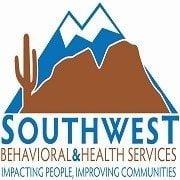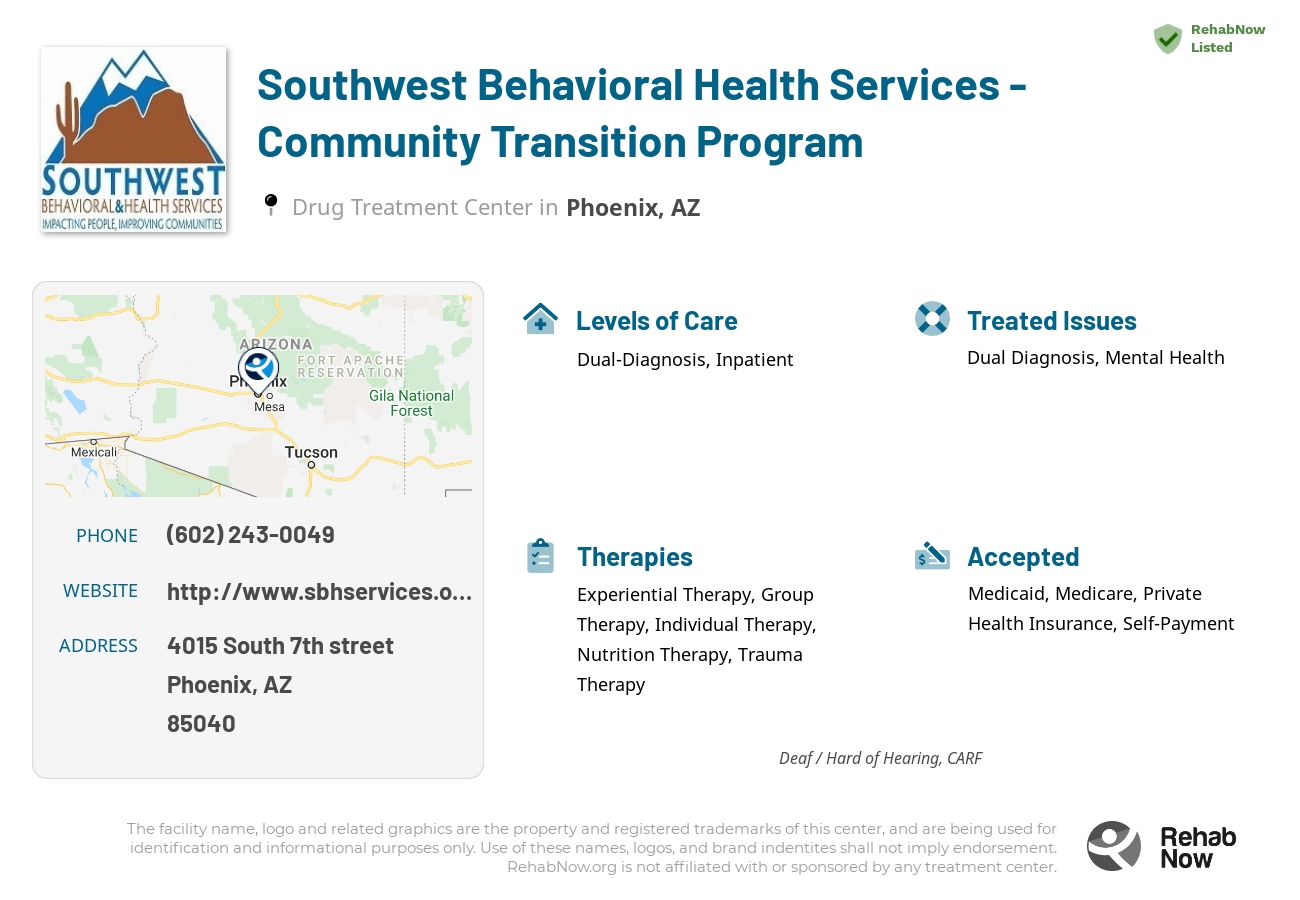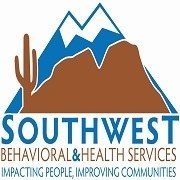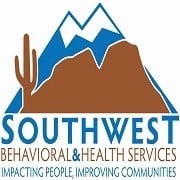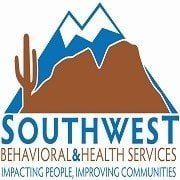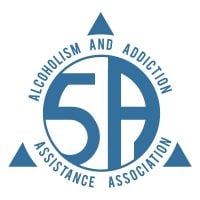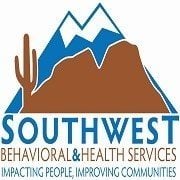Southwest Behavioral Health Services - Community Transition Program
Drug Rehab Center in Phoenix, Arizona
The Southwest Behavioral Health Services - Community Transition Program is an accredited Addiction Treatment Facility in Phoenix, AZ providing Dual-Diagnosis Inpatient Levels of Care and affiliated with the renowned Southwest Behavioral Health Services.
About This Arizona Facility
Southwest Behavioral & Health Services - Community Transition Program is a renowned dual diagnosis and mental health treatment facility situated in Phoenix, Arizona. As an accredited organization by CARF (Commission on Accreditation of Rehabilitation Facilities), Southwest Behavioral & Health Services is committed to providing exemplary services. They specialize in treating individuals suffering from dual diagnosis and mental health disorders, offering inpatient levels of care. Their facility is equipped to cater to the specific needs of their patients, ensuring comprehensive and personalized treatment plans that address both mental health and addiction concerns. Accepted private health insurance further facilitates access to these vital services.
Southwest Behavioral & Health Services - Community Transition Program offers a range of services for individuals struggling with addiction and substance abuse. Their primary focus is on dual diagnosis, meaning they address both the addiction aspect as well as any underlying mental health issues. Through their inpatient levels of care, individuals receive intensive treatment in a supportive and structured environment. Their services incorporate various evidence-based approaches, such as therapy and counseling sessions, medication management, and personalized treatment plans tailored to the specific needs of each patient. By providing comprehensive and integrated care, Southwest Behavioral & Health Services ensures a holistic approach to recovery and improved mental well-being.
Genders
Ages
Modality
Additional
Accreditations

CARF
The Commission on Accreditation of Rehabilitation Facilities (CARF) is a non-profit organization that specifically accredits rehab organizations. Founded in 1966, CARF's, mission is to help service providers like rehab facilities maintain high standards of care.
Conditions and Issues Treated
Dual Diagnosis refers to someone who is both dealing with addiction and another mental health issue.
There are different kinds of Dual Diagnosis: A person who simultaneously experiences both a mental illness and an addiction disorder. Or, a person who experiences one or more coexisting (simultaneous) mental health conditions in addition to a primary substance use disorder.
Some conditions that commonly co-occur with addiction include:
- Personality Disorders (Borderline, Narcissistic)
- Mood Disorders (Bipolar Disorder, Depression, Anxiety Disorder)
- PTSD (Post Traumatic Stress Disorder), OCD (Obsessive Compulsive Disorder), ADHD (Attention Deficit Hyperactivity Disorder)
- Schizophrenia, Psychosis, Hallucinations, Delusions
Levels of Care Offered at Southwest Behavioral Health Services - Community Transition Program
This center offers a variety of custom treatment tailored to individual recovery. Currently available are Dual-Diagnosis, Inpatient, with additional therapies available as listed below.
Individuals who are suffering from severe addiction or have a high risk for dangerous health concerns are often recommended to receive inpatient treatment.
Choosing to enter an inpatient treatment program is beneficial for people who are suffering from severe addiction, or who have a high risk for dangerous health concerns.
Inpatient treatment is beneficial for:
- People who have a history of severe withdrawal.
- People who have attempted to overcome addiction on their own without success.
- People who have a history of relapse, or have recently relapsed.
- People at risk for drug overdose or withdrawal-related complications.
- People with medical conditions that are worsened by drug or alcohol use.
Therapies & Programs
Therapy sessions focused on the individual addict can provide much-needed guidance as they work toward overcoming their addiction. These types of sessions typically involve guidance from a therapist, who will help addicts identify and process their feelings and cravings.
During these sessions, addicts may develop plans for coping with the triggers that typically lead to relapse and learn how to avoid those triggers during their recovery process.
Different types of addiction treatment services are available. Within this article, group therapy is of interest due to its high success rate compared to individual therapy. Group therapy settings are beneficial because they allow recovering addicts to build a strong support network.
Benefits of group therapy are:
- Reduces feelings of isolation
- Immediate access to social support in the form of fellow addicts in recovery
- Lowers risk of relapse
- Increases rate of sobriety
- Builds coping skills that can be applied to everyday life
Trauma Therapy is a form of therapy that involves working with a patient to help them process and understand the past trauma(s) in their life. The idea behind it is that while some people can experience traumatic events and not have lasting psychiatric symptoms, many others will. In these cases, memories of the event get hidden from consciousness but continue to influence how the person processes and copes with things in their life. They may avoid situations that resemble what happened or become suddenly angry or irritated to a situation that reminds them of a past event.
With the help of a therapist, people can go back over memories and experiences. This helps them understand why they are having problems coping with certain situations and how they can change how they think and react to things. This therapy is typically done using techniques such as visualization, discussion, and writing down thoughts and feelings.
Trauma therapists will work with clients to help them understand their past and present relationships. Many times, patients may believe that something is inherently wrong with them or that they are unworthy of love. A therapist aims to correct these negative feelings and behaviors by helping the person realize that their actions do not reflect who they truly are.
One of the main goals of trauma therapy is to help clients express their emotions and talk about what they are feeling. This benefits both to increase awareness of how certain events have impacted them in the past and enables patients to realize that they can make changes in their lives.
Cognitive Behavioral Therapy (CBT) is used by drug treatment centers to help addicts comprehend the causes of their substance abuse and the consequences that follow. Through CBT, clients learn to recognize and avoid high-risk situations and cope with challenging situations when they arise.
CBT treatment often includes a combination of individual therapy, group therapy, lectures, and other activities. The treatment’s goal is to help addicts gain self-control and maintain abstinence from drugs and alcohol over the long term so that an addict can get sober and lead a more productive life.
CBT is particularly effective in helping people overcome their drug problems, especially people whose drug abuse is motivated by self-defeating beliefs and emotions.
Good nutrition can be difficult for people recovering from addiction because they may not feel like eating while they are experiencing the physical and emotional side effects of detoxing.
Nutrition therapy can help addicts in the following ways:
- Helps individuals to understand which foods promote good health and support recovery that will assist them during detox
- Provides guidance and education in Phoenix, Arizona about how to maintain a nutritious diet so they can stay healthy during recovery
- Improves their overall health and well-being, which can reduce the severity of substance withdrawal symptoms.
Nicotine replacement therapies are effective because they provide you with the nicotine you are addicted to without inhaling carcinogens from cigarettes. Some types of NRT include nicotine gum, nicotine patches (transdermal systems), nasal spray, and lozenges. The benefits of using NRT can include reducing the risk of heart disease and cancer.
Patient Experience
Experiential Therapy at Southwest Behavioral Health Services - Community Transition Program
Experiential therapy is a form of psychotherapy where patients are asked to engage in activities such as role-play, poetry writing, music composition, exercising, or journaling to help process intense feelings. The aim of the therapy is to help patients access deeper, often hidden emotions by helping them explore their own body and mind.
Payment Options Accepted
For specific insurance or payment methods please contact us.
Is your insurance accepted?
Ask an expert, call (888) 674-0062
Southwest Behavioral Health Services Associated Centers
Discover treatment facilities under the same provider.
- Southwest Behavioral Health - Bullhead City Outpatient in Bullhead City, AZ
- Southwest Behavioral Health Services - Flagstaff Outpatient in Flagstaff, AZ
- Southwest Behavioral Health Services - Kingman Outpatient in Kingman, AZ
- Southwest Behavioral Health Services - Prescott Valley Outpatient in Prescott Valley, AZ
- Southwest Behavioral Health Services - Lake Havasu Outpatient in Lake Havasu City, AZ
Learn More About Southwest Behavioral Health Services Centers
Additional Details
Specifics, location, and helpful extra information.
Phoenix, Arizona 85040 Phone Number(602) 243-0049 Meta DetailsUpdated November 25, 2023
Staff Verified
Patient Reviews
There are no reviews yet. Be the first one to write one.
Phoenix, Arizona Addiction Information
Arizona has some of the highest rates of prescription drug abuse in the United States. Methamphetamines, heroin and morphine are among the most commonly abused substances. Prescription pain relievers were prescribed to 348 million people in 2012, enough to medicate every adult in Arizona for 2 full weeks. The number of people with substance use disorders in Arizona has remained relatively constant over the past few years.
In 2012, over 246,000 people were living in Phoenix dependent on or abusing drugs. This amounted to 10.8% of the city's population. In 2016, over 1,000 emergency room visits related to heroin and over 2,500 for cocaine. These numbers are only going up. There are many different rehabilitation facilities in the city and some 12-step meetings and support groups available for help.
Treatment in Nearby Cities
- Sun City, AZ (17.7 mi.)
- Chinle, AZ (237.4 mi.)
- Holbrook, AZ (150.2 mi.)
- Tolleson, AZ (11.6 mi.)
- Yuma, AZ (156.7 mi.)
Centers near Southwest Behavioral Health Services - Community Transition Program
The facility name, logo and brand are the property and registered trademarks of Southwest Behavioral Health Services - Community Transition Program, and are being used for identification and informational purposes only. Use of these names, logos and brands shall not imply endorsement. RehabNow.org is not affiliated with or sponsored by Southwest Behavioral Health Services - Community Transition Program.
